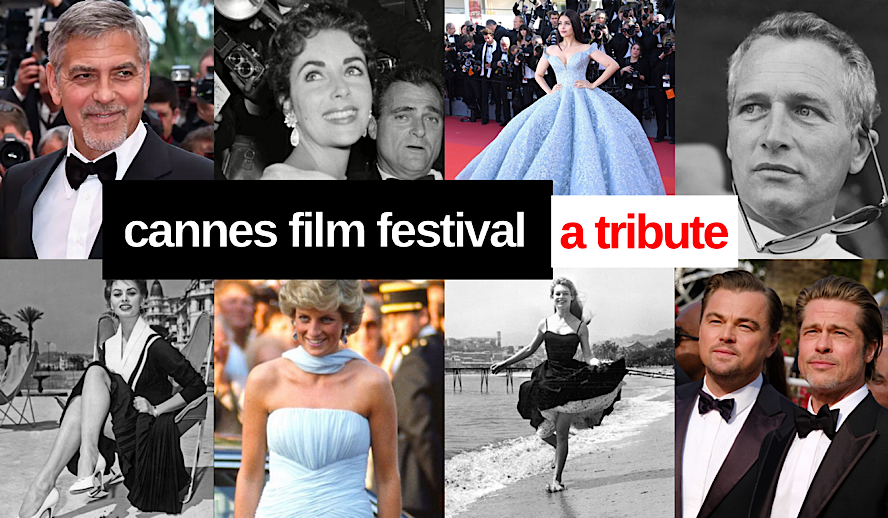Table of Contents

Video Version of this Article
Photo/Video: (From Left to Right) Cannes Film Festival Through the Years – George Clooney, Elizabeth Taylor, Aishwarya Rai Bachchan, Paul Newman, Sophia Loren, Brigitte Bardot, Leonardo DiCaprio and Brad Pitt/Hollywood Insider YouTube Channel
Festival de Cannes – Cannes Film Festival
While award shows such as the Oscars, Golden Globes, and Emmys are made to bring together actors, actresses, filmmakers, and artists in a night of honor and acknowledgment, nothing compares to the magic that the Cannes Film Festival brings. The festival, officially named Festival de Cannes, brings together all nationalities, races, origins; anyone who has a love for film comes together to enjoy ten days of celebrating moving pictures – Cinema. This experience is a celebration for Cinema, an opportunity not only to see actors and actresses dressed to their best but a chance to sit down and watch what they are all there for…film.
Related article: The Masters of Cinema Awards: Hollywood Insider Pays Tribute to ‘La Vie En Rose’, Exclusive Interview with Director Olivier Dahan
Related article: A Tribute to Agnès Varda: The Mother of the French New Wave Film Movement
Few events have grown to become more synonymous with cinematic exceptionalism over the last eighty years than that of France’s much-celebrated Cannes Film Festival. The annual assembly of the film industry’s best and brightest from around the globe at the palatial Palais des Festivals et des Congrès, Cannes is often cited as the center of international Cinema culture as well as one of its most fierce guardians. Founded in 1938 with an inaugural celebration eight years later in 1946, the festival has survived World Wars and civil upheaval, remaining a prominent pacesetter amongst the “Big Five” global film festivals along with Venice, Berlin, TIFF, and Sundance. During its lifespan, the festival has repeatedly proved itself as the foremost prediction of emergent filmic talent, celebrating the likes of Martin Scorsese’s ‘Taxi Driver’ (1976), Quentin Tarantino’s ‘Pulp Fiction’ (1994), and Bong Joon-ho’s ‘Parasite’ (2019).
Hollywood Insider’s CEO Pritan Ambroase’s Complete Support to Festival de Cannes 2021
Hollywood Insider’s CEO and philanthropist Pritan Ambroase believes in and utilizes the power of Cinema and has been a long-time passionate supporter of the Cannes Film Festival. He spoke on his admiration of the festival and the importance of the 74th edition in 2021 stating, “Quite simply, the show must go on! 2020 saw our world united in fear, so let us make 2021 the year where we unite in celebration and victory. I, wholeheartedly and passionately, support the Cannes Film Festival and its role as an ambassador and lighthouse for Cinema and its brilliance. To me, Cannes is synonymous with Cinema. And Cinema’s power to heal us, as individuals, and collectively as a society, cannot be underestimated. I am proof of Cinema’s ability to heal. I am proof of Cinema’s ability to help us, the human(s), to overcome all adversities. And I know I am not alone in this testament to the power of Cinema. Through my life’s many changes Cinema has been the constant. Various languages, yet the same magic.
My love for the Cinema began as a child. I was that peculiar child that enjoyed movies in many languages from many countries. You could say the need to read subtitles faster was my motivation behind learning to read at an abnormally young age. Cinema taught me about our world, and the power of that one-inch barrier ended up erasing all man-made borders for me. By the age of 6, while my friends named their favorite fairytales, cartoons and Power Rangers, I was naming favorite films by auteurs such as Steven Spielberg, Akira Kurosawa, Martin Scorsese, Luc Besson, Sergio Leone, Federico Fellini, Terrence Malick, Pedro Almodovar, Giuseppe Tornatore, Francis Ford Coppola, etc. By the age of 8, I had already become a fan of Cannes Film Festival and followed its yearly activities religiously, as the news of the films in competition and the iconic stars who attended Cannes enthralled me. I breathed, lived, and slept Cinema. As friends asked their parents to take them to Disneyland, my only destination of choice was the Cannes Film Festival. Cannes was my Disneyland.
Multiple home videos show me asking the cameraman to allow me to see into the lens – looking for the source of this magic that had transfixed, mesmerized, and hypnotized me. My passionate and faithful relationship with Cinema that began in early childhood, continues to this day. Since the age of 8, I have looked up to Cannes Film Festival as the beacon which upholds the highest standards for the best in Cinema. Cannes and Venice became my compass and guided my understanding of Cinema. And it is that same love for Cinema, Cannes and Venice, that turned me into a storyteller. Today, I feel lucky to call myself an artist with my chosen canvases being Cinema, media, TV and humanitarianism.
Here is the story of my long journey with Cinema in a short summary – I wrote my first screenplay at 12 years old, directed many short films by age 16, became the youngest person to be funded by British film funds to direct my first feature film at age 19 with corporations such as HSBC and others offering me additional funds, but – and a huge but at that – while directing that first film, I collapsed on set with a stroke on my spinal cord which paralyzed me. Yes, that was one sentence. Prior to the stroke, my team and I had already set our sights on Cannes as the festival to premiere the film, but the paralysis had other plans. The film was put on hold, Cannes was put on hold. I was only 19. While laying in that hospital bed, I refused to give up – I returned to my therapist, that therapist being Cinema. I watched movies all day and night to drown out my frustrations and pains of being in the hospital. So when I stated Cinema helped me overcome all adversities, I mean exactly that.
Eventually, a few months later, I defeated the paralysis, recovered fully and started walking again. And the first place I walked to – was my home, the second place – a movie theatre – my second home – and thus, I found myself again – finding my light in that dark auditorium at my hometown in England. Fast forward a decade and today, I continue on with Cinema and media, not just as an audience member – but also as a creator/storyteller and professional member of Cinema and media – thus, here I am paying homage to Cinema and Cannes Film Festival. Again, I am not alone – in this testament to the power of Cinema.
Festivals like Cannes and Venice unite people from all around the world, be it Italy, UK, Japan, Ghana, Nepal, Brazil, Iran, France, USA, South Korea, Australia, etc. – as long as you have made quality Cinema, no matter where you are from, your talent is sacred, your Cinema is sacred, and you are provided a platform to showcase your Cinema to a global audience – thus uniting us. The wisdom I learned from Cannes and Venice and my understanding of Cinema’s power guides this media network Hollywood Insider and my charity foundation Humans of our World as both utilize the power of Cinema to unite humans from all over the world regardless of physical, mental and political borders.
In this year 2021, the 74th Cannes Film Festival will bring our world back together in celebration – precisely the celebration of Cinema – a magical art form that has touched individuals of all ages, colors, and languages past all borders natural or man-made political. Cannes Film Festival 2021 will be a definite positive – Cinema being that aspect of our modern civilization that elevates us to greater levels. This is in sharp contrast to the pandemic-ridden year of 2020 which unified the whole of modern human civilization and all countries in fear, sadness, and grief – a definite negative through which we were reminded of our humanness, our unity as one human race, and the fragility of it – albeit due to the COVID-19 virus. The pandemic traumatized one and all causing suffering in some way, shape, or form, irrespective of skin color, man-made political borders, and GDP per capita hierarchies.
It is time, that we show the virus that we are NOT defeated.
We, the humans, will rise and prosper again, and again, and again. Cinema and art have long been the signature of a prospering civilization. Cinema and art have also been utilized as a protest against the evils of society. In fact, Festival de Cannes was borne out of a protest against Hitler and Mussolini’s invasion of the film industry and abuse of Cinema. In 2021, that very same festival that stood up against human dangers such as Hitler and Mussolini in the past, is standing up against the health danger known as COVID-19. Cannes must be commended for its efforts in uniting our world in a safe manner to celebrate humanity through the art of Cinema. The organizers under the leadership of Thierry Frémaux will leave no stone unturned in their mission to take every precaution to keep us safe. I am wholly aligned with Cannes, in regards to its celebration of Cinema as well as its focus on bettering our environment.
Cinema is more than just a form of entertainment, it is an integral part of society. I continue to be highly impressed with Cannes as they reinforced my faith in humanity and the feats we can achieve when we unite across all borders. I love the world uniting, be it for Cinema, art, fashion, sport, etc. Let us keep Cinema going for always and forever. Long Live Cinema. Long Live Movie Theaters. Long Live Festival de Cannes.”
Related article: A Tribute to Leonardo DiCaprio: The Generation Defining Thespian & Hollywood Legend
Related article: A Tribute to Anders Thomas Jensen – The Brilliant and Bizarre Storyteller & Pioneer of Danish Cinema
Despite its expansive history, many may still be unfamiliar with the machinations of Cannes due to its exceeding exclusivity and impressionistic approach to selecting the highest quality of film. Thierry Frémaux, General Delegate of Cannes since 2007, said of the festival’s mission, “In order to achieve this level of longevity, the Festival de Cannes has remained faithful to its founding purpose: to draw attention to and raise the profile of films, with the aim of contributing towards the development of cinema, boosting the film industry worldwide, and celebrating Cinema at an international level.”
View this post on Instagram
With this pursuit in mind, Cannes sends ‘headhunting’ talent scouts around the world to seek out the very best that Cinema has to offer, from a raucous release headlined by a celebrated auteur to a humble offering from a scrappy first-timer, culminating in the eventual catalog assembled for the festival’s festivities dubbed the Official Selection. Each year, the Cannes board of directors appoints a new jury to watch and assess the selected films, ultimately arriving at the awarding of special prizes to the festival’s best. The greatest honor a film can receive comes in the form of the Palme d’Or (the equivalent of the Best Picture at the Academy Awards). Additional awards are given out such as the Grand Prix and Prix du Jury given for supplementary favorites, the Camera d’Or for the best debutant director, and selections for best actor, actress, director, and screenplay.
Over 41,000 actors, actresses, filmmakers, artists, journalists, designers, models, producers, and others come to the Cannes Film Festival every year. Unlike one-night award shows, this festival humanizes the people we are told to idolize as perfect representations of men and women we will never have the chance to become. With flawless skin, hair, physiques, and attitude, their lives are untouchable, and yet this festival, while filled with glamour, allows a semi-casual atmosphere.
Related article: A Tribute to Great International Film Directors & Their Films
Related article: Will the Diversity in Victory of Last Year’s Oscars 2019 – 91st Academy Award Winners Ever Be Repeated?
If you’ve never studied film or been on a set, then the chances of you knowing the volume of work it takes to shoot a single scene would blow your mind to learn. The number of people and hours of dedication to perfect a single shot that only has under five seconds to impact a storyline, it’s genuinely amazing and challenging even to wrap your mind around. This event is the time in which film lovers, aspirers, and art-admirers come together to appreciate the art and the influence film brings to the world. In addition, the Cannes Film Festival is an outlet for flowing filmmaking perspectives and ideas, such as the French New Wave, which influenced the American film noir from the ’40s and ’50s. The Cannes Film Festival is truly an extraordinary event, but its beginning was not as perfect as its prestigious outcome.
To those who breathe, live, and study filmmaking, those indescribable moments when the theater sits in silence to witness the bittersweet existence of another life in a fictional universe, there truly is nothing comparable. As people, our connections to strangers never come closer than when we sit arm to arm with someone; we will never know their name or life story. And yet, for two hours, we casually sit next to strangers, all going through the same adventure of indulging ourselves with fictional stories. There are small yet heart-swelling things in our lifetimes that make life worth living, one of those being that people write and create worlds that do not exist within our lives but solely in our imaginations.
These made-up characters, storylines, and universes save real lives every single day. Real people with real issues who are trapped and alone in their minds but find that a fictional world filled with crime-fighting superheroes or wizards with best friends is the one thing to stop them from ending it all. Men, women, and non-binary filmmakers, the ones who dedicate their lives to create moving art that challenges social norms or dictates the power of love; these people are heroes to many real people.
Beginning In Darkness – Remarkable Origins as a Beacon Against Hate
The beginning of the most prestigious film festival, hosting some of the world’s most distinguished films and guests, was not an easy journey as the event’s creation began in one of the darkest eras of our existence. With hate surrounding every corner of the world, the Cannes Film Festival started as an indirect result of Fascism during World War II. In 1932, the world’s first annual international film festival was inaugurated in Venice to great applause and celebration of Cinema became paramount.
Related article: MUST WATCH – Hollywood Insider’s CEO Pritan Ambroase’s Love Letter to Black Lives Matter – VIDEO
Subscribe to Hollywood Insider’s YouTube Channel, by clicking here.
But by 1938, the Venice Film Festival had been invaded by Fascist and Nazi propaganda, heavily interfered upon by the authoritarian fascist bent of Italy’s then-Prime Minister Benito Mussolini and their allies within the rapidly ascending Third Reich in Germany. As a result, the prize-winners and film selections were heavily favored towards countries of the fascist alliance, such as Benito Mussolini’s Italy and Adolf Hitler’s Germany, leading all views to be one-sided. Venice was overtaken and a clear lack of neutrality was evident when it came to selecting and awarding films.
In 1938 when French director Jean Renoir’s ‘La Grande Illusion,’ an anti-war film, a clear winner, lost for the top prize, the Coppa Mussolini, to the Mussolini-produced war film ‘Luciano Serra, Pilot’ (1938) and the ‘Olympia’ (1938) documentary crafted by the Nazi Ministry of Enlightenment and Propaganda, the bias was made more apparent than ever. The film was then banned in Germany and Italy and labeled as “Cinematic Public Enemy No. 1.” This led the French, British, and American jury members to withdraw from the festival.
Angered by this, some of the film industry’s most powerful influences such as Robert Favre Le Bret (founder and the Cannes Film Festival longest-serving President), Louis Lumière (the co-creator of Cinema), and French writer Philippe Erlanger, brought a petition to the French government requesting an international film festival in France. The creation of the festival was first imagined by French Minister of National Education Jean Zay in 1938 as a direct competitor to the internationally predominant Venice Film Festival. A festival in which no political bias or censorship would be allowed, a complete difference from the Venice Film Festival’s heavy ties to Fascism, albeit unwillingly.
Related article: Cannes Best Director Winner ‘Cold War’: Love & Passion During War
With some hesitation of upsetting opposing forces, France finally caved into the influential figures and established a film festival at Cannes to be held in 1939 from September 1st to the 20th. This month was chosen by city officials who believed that this would extend the summer tourist season by a couple of weeks. With the beautiful weather and French Riviera resort experience that Cannes brought and the municipal authorities willing to build an expensive venue, Cannes was ultimately the perfect destination. At the time, the official name for the festival was Le Festival International du Film which would later be changed.
This abdication quickly escalated into the formation of Cannes as a signature bastion of artistic freedom and diversity in the face of Venice and the rising tide of the fascist doctrine. The festival aimed to “encourage the development of all forms of cinematographic art and foster a spirit of collaboration between film-producing countries.”
Hollywood icons like Cary Grant (‘Charade’), Gary Cooper (‘High Noon’), Norma Shearer (‘The Divorcee’), and Spencer Tracy (‘Guess Who’s Coming to Dinner’) arrived at the French Riviera for the first-ever night of festivities on August 31, screening William Dieterle’s ‘The Hunchback of Notre Dame’ (1939) with plans to premiere the likes of Victor Fleming’s ‘The Wizard of Oz’ (1939) and Howard Hawks’ ‘Only Angels Have Wings’ (1939).
Devastatingly enough, with hate spreading across the world like wildfire, on September 1st, Hitler invaded Poland, the day the festival began. A case of bad luck at its worst – the festival had only screened one film before shutting down completely, ‘The Hunchback of Notre Dame,’ directed by Willaim Dieterle, a German American director. Only two days after the invasion, France and Britain declared war on Germany, leaving the festival to be forgotten as war became the primary focus. The Second World War officially began, halting all festival activities.
Related article: A Tribute to Ennio Morricone – A Legendary Composer & Hollywood Icon
Subscribe to Hollywood Insider’s YouTube Channel, by clicking here.
View this post on Instagram
A Second Attempt At Celebrating Film
With innocent death one after another caused by hate-stricken monsters, World War II finally came to an end six years later. Trying to bring tourists back to the French Riviera after being frightened to do so, France’s provincial government approved a second attempt at the Le Festival International du Film in 1946.
It would be until the other side of the war for the festival to officially return in 1946, with 21 countries seizing the opportunity to finally present their films at Cannes. At the Casino of Cannes on September 20th, 1946, the Cannes Film Festival began.
From England came David Lean’s immortal fated romance ‘Brief Encounter’ (1945), from Italy came Roberto Rossellini’s revolutionist landmark ‘Rome, Open City’ (1945), from France came Jean Cocteau’s fantastical ‘Beauty and the Beast’ (1946), and from America came seminal classics like Billy Wilder’s ‘The Lost Weekend’ (1945), Charles Vidor’s ‘Gilda’ (1946), and Alfred Hitchcock’s ‘Notorious’ (1946) and American entrepreneur Walt Disney’s ‘Make Mine Music’.
Louis Lumière became the festival’s inaugural jury President and gave great honor in deciding the strong line-up of international pieces. From the start, the festival’s emphasis was more on diversity and artistic achievement rather than on competition; however, nine films were still honored with the top award, Grand Prix.
From this point on, the festival was a roaring success with a few bumps along the way, such as economic issues canceling the 1948 and 1950 festivals. Still, in 1947 the festival fell under the Centre National de la Cinématographie (CNC), a government body whose purpose is to preserve France’s Cinema culture and the cinematic arts. Rather than having films chosen by the festival, governments of the film’s respective countries chose their submissions.
Related article: Hollywood Insider’s CEO Pritan Ambroase: “The Importance of Venice Film Festival as the Protector of Cinema”
Related article: – Want GUARANTEED SUCCESS? Remove these ten words from your vocabulary| Transform your life INSTANTLY
The Evolution of the Festival from the Fifties
In the 50s, the festival realized that its rivals such as the Venice Film Festival and the Berlin International Film Festival were hosting their events earlier in the year. So, with some consideration, Cannes agreed to move their event from September to April as an introduction to their local tourist industry. Very quickly, the festival featured some of the world’s most significant filmmakers and films, such as English director Alfred Hitchcock’s ‘I Confess,’ American director Orson Welles’ ‘Othello,’ and American director George Stevens’ ‘A Place in the Sun.’
In 1952, the festival’s permanent residency for three decades landed in Palais Croisette, but success in later years would deem this home unsuitable for the number of attendees. The 1950s marked the cultural formation of the festival, rapidly skyrocketing in popularity due to the various celebrities and uber-famous faces like Kirk Douglas, Sophia Loren, and Grace Kelly that populated its constituency.
Also, in the ‘50s, the festival gained a lot of tourism and publicity traction with scandals and publicity stunts. In 1953, the stunning Brigitte Bardot influenced the festival’s future traditions as she wore a bikini in front of the cameras on the infamous shoreline. The French activist, actress, and singer shocked the world as Kirk Douglas even said, “I’ve never seen one of those before” as he spoke about the bikini. In 1954, 26-year-old French star Simone Sylva posed topless on the beach for the cameras and was then named “Miss Festival.”
Sylva stood alongside Robert Mitchum as she cupped her bare chest and went as far as indirectly injuring several photographers who were clawing at the opportunity to snag a shot of her. Oh, the power women behold. The Cannes Film Festival was now branded within everyone’s minds as a beautiful woman lingered within their eyesight, and all I can say is, Sylva is a badass woman. Just adding to the beach pictures, in 2006, Sacha Baron Cohen made his iconic appearance as Borat in a neon mankini.
Related article: A Tribute to Hayao Miyazaki: Enchanted Edifice of the Master Storyteller
View this post on Instagram
Best Dressed At The Cannes Film Festival
Speaking of the history of Cannes is incomplete without speaking of…… fashion. For many decades, the Cannes Film Festival has been one of the most glamorous events of the year, filled with the most notable stars. These industry officials, models, Hollywood stars, and international figures from Cinema all come dressed to impress. Cinema, fashion and glamour are served on a platter with every taste bud provided for. Hollywood Insider has closely observed and chronicled the fashion at Cannes over the years with awards such as Best Dressed at Cannes Film Festival.
Cannes Trophies
In 1954, Parisian jeweler Suzanne Lazon suggested that the festival’s award trophies should be in a palm tree design as the environment had become a staple of the event. French director Jean Cocteau, Lazon’s friend, picked up the idea and created a design that amazed the festival so much that the top prize, Grand Prix, was renamed Palme d’Or. The first Palme d’Or was given to Delbert Mann for ‘Marty;’ however, the award’s new name was short-lived and went back to the Grand Prix for two decades until being reinstated in 1975.
Politics and Cannes
This 50s period also saw the grips of the Cold War spell out a brief rise of cinematic censorship in the pursuit of total political abstinence, omitting films like French director Alain Resnais’ Holocaust documentary ‘Night and Fog’ (1956), a cut-throat documentary that shows the true monster mentality of WWII, and follow-up set in post-war Japan ‘Hiroshima, Mon Amour’ (1959). Jean Cocteau, President of the jury at the time, was quoted to have said, “The Cannes Festival should be a no man’s land in which politics has no place. It should be a simple meeting between friends.” Throughout the decade and the one that followed, the festival made a wholehearted push to expunge the ills of censorship and create a space where film was allowed to exist amorphous and aggrandized.
Related article: A Tribute to ‘Scarface’: The Timeless ‘80s Meditation on Excess and the American Dream | Al Pacino
Related article: A Tribute to ‘Amélie’: 20 Year-Anniversary – The Audrey Tautou Starrer Still Captures The Simple Joys Of Life
At the festival of 1968, this political freedom was marked by the protests surrounding the students and labour strike that beleaguered the whole of France. Some of Cannes’ most esteemed directors including Louis Malle, Jean-Luc Godard, Miloš Forman, and François Truffaut stormed a screening of Carlos Saura’s ‘Peppermint Frappé’ (1967), holding the curtain closed and halting the festival. From this came the dawn of a new era for Cannes focused on promoting empowering and often controversial films for their impact on the artform and the global narratives surrounding it. This lead brash and boisterous outings like Robert Altman’s ‘M*A*S*H’ (1970), Mohammed Lakdhar-Hamina’s ‘Chronicle of the Years of Fire’ (1975), and Francis Ford Coppolla’s ‘Apocalypse Now’ (1979) coming to define the 1970s.
In the 1980s and into the 1990s, a more totalistic selection from around the world was focused upon, including nations like the Philippines, Australia, India, and Argentina. The 1990s additionally saw the prevalence and prosperity of studio-unaffiliated independent productions from America due in large part to a tense disagreement between France and the U.S. over whether film and television fell under free trade rules. This allowed for more distinctly original stories to be told by lesser-known talents at the festival, including Joel and Ethan Coen in their pitch-black Hollywood satire ‘Barton Fink’ (1991), Spike Lee’s ‘Jungle Fever’ (1991), and famously Quentin Tarantino’s unchronological sophomore epic ‘Pulp Fiction’ (1994).
View this post on Instagram
Becoming The Most Prestigious Film Festival In The World
In a short amount of time, Festival International du Film de Cannes became the most prestigious film festival globally and stands true to this day. In these early days, rather than viewing films, Cannes was an event for tourists and socialites who enjoyed a good party. Like F. Scott Fitzgerald said in his novel ‘The Great Gatsby,’ “And I like large parties. They’re so intimate. At small parties there isn’t any privacy.” But, like other film festivals, this event also became an international marketplace between filmmakers, producers, and distributors to exchange ideas, sign contracts, and make money.
Related article: Inside the Neon-Infused Enigma of Nicolas Winding Refn’s Contrasting Characters and Their Seven Deadly Sins
Related article: A Tribute to ‘Stand By Me’: The River Phoenix Film Still Stands as the Most Iconic Friendship Journey
In 1959, the first global platform for film commerce, Marché du Film (Film Market), was founded and gave the festival a commercial edge between business people in the film industry. With over 12,500 participants currently, the Marché du Film remains the world’s leading market for the global film industry. In 1965, British-American actress Olivia de Havilland became the first woman as jury President for Cannes, followed by Italian actress Sophia Loren. Films screened at the Cannes Film Festival in the ’60s included American director Robert Mulligan’s ‘To Kill a Mockingbird,’ French director François Truffaut’s ‘La Peau Douce,’ and Italian director Federico Fellini’s ‘La Dolce Vita.’
On February 9th, 1968, the non-profit organization, Cinémathèque Française, decided to remove Henri Langlois, director, and co-founder of the organization. The issue arises when the resignation of Langlois, a prevalent figure for the French New Wave, angered his followers and admirers, such as French-Swiss director Jean-Luc Godard and François Truffaut. This news coincided with the beginning of Cannes’ 1968 festival, so directors Louis Malle and Roman Polanski resigned from the jury and requested that the festival shut down in protest against the resignation.
In addition, other film directors such as Stanley Kubrick, Roberto Rossellini, and Charles Chaplin sent letters to the Cinémathèque explaining their anger and threats to retract their films from their archives. The protest went as far as to Godard and Truffaut, bursting into a theatre and hanging from the curtains to prevent the screening.
Soon after, Henri Langlois was reinstated into the CNC, but it was too late to resume the 1968 Cannes Film Festival after the protest. In 1972, Robert Favre Le Bret became the new President and brought many changes to the festival, such as Cannes choosing the films themselves rather than having the corresponding countries. This new change was the beginning for the selection process used by film festivals to this very day.
The ’70s brought the force of American directors with films such as Martin Scorsese’s ‘Alice Doesn’t Live Here Anymore,’ and ‘Taxi Driver,’ Steven Spielberg’s ‘The Sugarland Express’ and Francis Ford Coppola’s ‘The Conversation.’ Although do not be blinded, American directors were not the only force with the appearance of Russian director Andreï Tarkovski’s ‘Solaris,’ Polish-French director Roman Polanski’s ‘The Tenant,’ and British director Ridley Scott’s ‘The Duellists.’
Related article: A Tribute to Steven Spielberg: The Father of the American Blockbuster
When the festival began getting larger than ever before in the ‘80s, its old home in the Palais Croisette was no longer suitable. So in 1982, the city of Cannes built a new conference center Palais des Festivals et des Congrès, with many stars such as Johnny Hallyday, Clint Eastwood, Jean-Paul Belmondo, and Sharon Stone leaving their handprints in clay outside the building. The 1980s were dominated by Japanese director Akira Kurosawa who was previously bankrupt but was helped financially by George Lucas and Francis Ford Coppola.
With their help, Kurosawa made ‘Kagemusha,’ which earned the top prize, Palme d’Or, along with American theatre director Bob Fosse’s ‘All That Jazz.’ Other films that starred in the ’80s included German director Win Wenders’ ‘Paris, Texas,’ New Zealand director Jane Campion’s ‘Sweetie,’ and French-Swiss director Jean-Luc Godard’s ‘Passion.’
Inclusion Of Independent Films
The 1990s continued the independent theme set by 1989’s surprise winner for the Palme d’Or, American director Steven Soderbergh’s indie ‘Sex, Lies, and Videotape.’ The 26-year-old Soderbergh won over Spike Lee’s ‘Do The Right Thing,’ which angered Lee but heightened the boost for indie films in the U.S. Films screened in the ’90s included American directors Coen Brothers ‘Barton Fink,’ American director Quentin Tarantino’s ‘Pulp Fiction,’ and American director Robert Altman’s ‘The Player.’ In 1993, New Zealand director Jane Campion became the first and currently only female director to win the Palme d’Or for ‘The Piano.’
To celebrate the 50th anniversary in 1997, the festival brought back Palme d’Or winners to pay tribute to half a century of film in Cannes. Swedish director Ingmar Bergman, known for his pieces such as ‘The Seventh Seal,’ ‘Persona,’ and ‘Wild Strawberries,’ was awarded the Palme des Palmes to honor his cinematic mastery. Throughout the ’90s, Cannes did a brilliant job at presenting a diverse mix of films such as Danish Director Lars von Trier’s ‘Breaking the Waves,’ British director Terry Gilliam’s ‘Fear and Loathing in Las Vegas,’ and Japanese director Takeshi Kitano’s ‘Kikujiro.’
View this post on Instagram
Related article: An Analysis of ‘The Great Gatsby’: Hamartia, Hubris, and the Hollow American Dream
Related article: In Honor of Awards Season, A Tribute to the Greatest Acting Teachers – Stanislavski, Strasberg, Adler & Meisner
Cannes’ Mentorship and Guidance Program – La Cinéfondation
With soaring director after director, the festival began noticing that upcoming filmmakers were having difficulty getting their work shown. The new millennium brought about yet another opportunity for outreach and advancement for Cannes, seeing the formation of La Cinéfondation in 1998 by Gilles Jacob, which spotlighted film school productions and young creators dedicated to supporting young creators from scriptwriting, recognizing their work on a global scale, and looking for financial support. The program would allow for the inexperienced writers or directors to work on their production with the industry’s premier minds as well as establishing a network of connections to serve them throughout their careers.
La Cinéfondation additionally serves as a means by which up to twenty upshot directors and their projects are selected for funding and advising. The Cinéfondation then created the Atelier that selects fifteen feature film projects and invites the directors to the festival so that they can link up with industry professionals. While much has changed in both the world and the industry since the inception of Cannes in 1938, the heart of the festival and its commitment to preserving filmic integrity and imagination has only grown stronger with each decade.
The 2000s and the New World of Digital Technology
The 2000s brought out the new world of digital technology and the future of filmmaking. In 2000, Lars von Trier’s ‘Dancer in the Dark’ became the first digitally shot film to win the Palme d’Or. A year later, the previously known Festival International du Film de Cannes shortened its name to Festival de Cannes, which is still used today. In the same year, American director Michael Moore’s ‘Bowling for Columbine’ became the first documentary to screen in competition and would go on to win a Palme d’Or for ‘Fahrenheit 9/11’ still noted as the only documentary to take home the top prize.
View this post on Instagram
Related article: Examining the 10 Best American Films From the AFI’s “100 Years…100 Movies” List
Related article: A Tribute to Terrence Malick: An Evolution of Thought on Film
In this decade, films that received accolades included Roman Polanski’s ‘The Pianist,’ American director Gus van Sant’s ‘Elephant,’ and Australian director Baz Luhrmann’s ‘Moulin Rouge.’ On the other hand, Vincent Gallo’s ‘The Brown Bunny’ received one of the longest-standing “boos” in festival history with his unwatchable film starring himself. The Cannes crowds are known not to be afraid of showing their displeasure, and they did not hold back from tearing Gallo apart. This film, to most critics, is still labeled as the “Worst Film” ever shown at the Cannes Film Festival. Lars von Trier screened his film ‘Antichrist’ that included genital mutilation, but he did not stop there as in 2011, he became known as persona non grata (an unwelcome person) after he made some disturbing comments during one of his press conferences for ‘Melancholia.’
In recent years, films that became crowd pleasers included Greek director Yórgos Lánthimos’ ‘The Lobster,’ American director Wes Anderson’s ‘Moonrise Kingdom,’ and American director Todd Haynes’ ‘Carol.’ Some memorable moments of the 21st century include when Lindsay Lohan was issued a warrant for arrest after failing to show up for a scheduled court hearing. Instead, she was caught partying the night away on the French Riviera. A year later, Canadian actor Ryan Gosling had a bromance moment and kissed his director Nicolas Winding Refn for ‘Drive.’
In 2015, a security guard kicked out women from the ‘Carol’ screening when they were caught breaking the female dress code. This sexist policy banned women from wearing flat shoes and pants to premieres. Three years later, artistic director Thierry Frémaux created the “no selfies” rule, so no selfies and no flat shoes. 82 women in 2018, including Kristen Stewart, Jane Fonda, Agnès Varda, Patty Jenkins, and Cate Blanchett, walked arm-in-arm protesting against the festival’s treatment of women. Stewart later removed her high heels and walked up the famous staircase barefoot.
Related article: An Analytical Guide to Yorgos Lanthimos’ Early Films: Low on Intimacy, High on Violence
Related article: The Winner’s Journey: Adam Driver – An Unconventional Leading Man
View this post on Instagram
Structure Of The Cannes Film Festival – Award Categories
The Official Selection separates into categories, with feature films only eligible for Palme d’Or, Grand Prix, and the Jury Prize. Then you have sidebars such as The Director’s Fortnight and International Critics Week that give out their own rewards and have different criteria for their selection. In 1978, the Un Certain Regard was created for non-traditional stories, and winners of this category are given the grant to help them with the international distribution of their work. Finally, the Short Film Corner, apart from the Official Selection, allows you to submit your short film for a fee.
Official Selection Prizes
Palme d’Or – The Golden Palme
Grand Prix – Second Most Prestigious
Prix du Jury – Jury Prize
Caméra d’or – Best Feature Film By First-Time Director
Palme d’Or du court métrage – Best Short Film
Prix d’interprétation féminine – Best Actress
Prix d’interprétation masculine – Best Actor
Prix de la mise en scène – Best Director
Prix du scénario – Best Screenplay
Related article: The Masters of Cinema Awards: Hollywood Insider Pays Tribute to ‘Dil Se’, Exclusive Interview with Director Mani Ratnam
Related article: Remembering Sean Connery: A Tribute to a Legend Who Launched the James Bond Franchise
Un Certain Regard Prizes
Un Certain Regard – Jury Prize
Un Certain Regard – Best Performance
Un Certain Regard – Best Director
Un Certain Regard – Jury’s Coup de Coeur
Un Certain Regard – Jury’s Special Mention
A Look Forward at the Official Selection for 2021
For the first time in decades, 2020 saw the postponement and eventual cancellation of the Cannes Film Festival in light of the COVID-19 pandemic. The 74th annual Cannes Film Festival will take place from July 6th to 17th. ‘Annette’ by Leos Carax starring Adam Driver and Oscar Winner Marion Cotillard of ‘La Vie en Rose’ fame, are set to open the 74th Cannes Film Festival. ‘Do The Right Thing’ (1989) and ‘BlacKkKlansman’ (2018) director Spike Lee will head the jury. In addition, Jodie Foster will be receiving the festival’s honorary Palme d’Or in honor of her artistic journey.
View this post on Instagram
Related article: River Phoenix: 32 Facts on the Phenomenal Hollywood Icon & Legendary Superstar | A Tribute
Related article: A Tribute to Hans Zimmer: The Greatest Film Composer of the Modern Era
The recently announced Official Selection for 2021 features several major premieres from some of film’s biggest stars and greatest talents. Wes Anderson’s long-awaited live-action follow-up to ‘The Grand Budapest Hotel’ (2016), ‘The French Dispatch’ (2021) will have its first-ever screening at the festival, joining the likes of ‘The Florida Project’ (2017) director Sean Baker’s ‘Red Rocket’ (2021) and ‘Columbus’ (2017) director Kogonada’s ‘After Yang’ (2021) as representatives of the United States.
Other anticipated festival releases from around the world include ‘RoboCop’ (1987) Netherlandian director Paul Verhoeven’s ‘Bendetta’ (2021), and Moroccan director Nabil Ayouch’s ‘Casablanca Beats’ (2021). These only represent a small fraction of the talent set to be on display at the festival and while there may be much uncertainty in the world at large, there is one thing to be sure about; Cannes, and Cinema itself, is ready to mount a colossal comeback.
Keeping Cinema Alive For Future Generations – A Lasting Dedication to Cinematic Ingenuity and Inclusivity
The festival remains to be one of the most famous and most significant media events on the planet. Every year, thousands of films from over 100 countries submit to the festival, hoping to be considered for the official selection; however, only 50 feature films and 30 short films are chosen to compete in the competition. Not only does the Cannes Film Festival dedicate its time to recognizing creators, uplifting future filmmakers, and creating connections between individuals around the world, but they are consciously worrying about the environment. At the festival, 60% of the transportation is done using electric and hybrid vehicles, eco-responsible dining, elimination of plastic water bottles, and sourced goods from France and Europe.
No matter the era, Cannes has continuously embodied the greatest heights of world Cinema and remained a dedicated defender of film’s history and culture. If Cinema is indeed the international language as it was originally intended to be, then Cannes has long served as its foremost almanac, uniting cultures, peoples, and artistry from around the globe together for a week of boundary-breaking celebration. A genuine chronology of global Cinephiles within the pantheon of Palme d’Or winners and Cannes legends, offering a wealth for any cinema-lover and a guide for any aspiring filmmaker. To all the lucky ones attending Cannes Film Festival 2021, enjoy that moment of silence as you stare in awe and gratitude at the screen – then magic happens – and, voila, Cinema!
By Isabella Brownlee and Andrew Valianti
Click here to read Hollywood Insider’s CEO Pritan Ambroase’s love letter to Black Lives Matter, in which he tackles more than just police reform, press freedom and more – click here.
An excerpt from the love letter: Hollywood Insider’s CEO/editor-in-chief Pritan Ambroase affirms, “Hollywood Insider fully supports the much-needed Black Lives Matter movement. We are actively, physically and digitally a part of this global movement. We will continue reporting on this major issue of police brutality and legal murders of Black people to hold the system accountable. We will continue reporting on this major issue with kindness and respect to all Black people, as each and every one of them are seen and heard.
Just a reminder, that the Black Lives Matter movement is about more than just police brutality and extends into banking, housing, efducation, medical, infrastructure, etc. We have the space and time for all your stories. We believe in peaceful/non-violent protests and I would like to request the rest of media to focus on 95% of the protests that are peaceful and working effectively with positive changes happening daily. Media has a responsibility to better the world and Hollywood Insider will continue to do so.”
Ways to support Black Lives Matter Movement to end systemic racism
More Interesting Stories From Hollywood Insider
– Want GUARANTEED SUCCESS? Remove these ten words from your vocabulary| Transform your life INSTANTLY
– Compilation: All James Bond 007 Opening Sequences From 1962 Sean Connery to Daniel Craig
– Do you know the hidden messages in ‘Call Me By Your Name’? Find out behind the scenes facts in the full commentary and In-depth analysis of the cinematic masterpiece
– A Tribute To The Academy Awards: All Best Actor/Actress Speeches From The Beginning Of Oscars 1929-2019 | From Rami Malek, Leonardo DiCaprio To Denzel Washington, Halle Berry & Beyond | From Olivia Colman, Meryl Streep To Bette Davis & Beyond
– In the 32nd Year Of His Career, Keanu Reeves’ Face Continues To Reign After Launching Movies Earning Over $4.3 Billion In Total – “John Wick”, “Toy Story 4”, “Matrix”, And Many More
cannes film festival 2021, cannes film festival 2021, cannes film festival 2021, cannes film festival 2021, cannes film festival 2021, cannes film festival 2021, cannes film festival 2021, cannes film festival 2021, cannes film festival 2021, cannes film festival 2021, cannes film festival 2021, cannes film festival 2021, cannes film festival 2021, cannes film festival 2021, cannes film festival 2021, cannes film festival 2021, cannes film festival 2021, cannes film festival 2021, cannes film festival 2021, cannes film festival 2021, cannes film festival 2021, cannes film festival 2021, cannes film festival 2021, cannes film festival 2021, cannes film festival 2021, cannes film festival 2021, cannes film festival 2021, cannes film festival 2021, cannes film festival 2021, cannes film festival 2021, cannes film festival 2021, cannes film festival 2021, cannes film festival 2021, cannes film festival 2021, cannes film festival 2021, cannes film festival 2021, cannes film festival 2021, cannes film festival 2021, cannes film festival 2021, cannes film festival 2021, cannes film festival 2021, cannes film festival 2021, cannes film festival 2021, cannes film festival 2021, cannes film festival 2021, cannes film festival 2021, cannes film festival 2021, cannes film festival 2021

Isabella Brownlee is an experienced writer, video editor and filmmaker. She is currently a writer for Hollywood Insider, focusing on detailed and thought-provoking film reviews and articles discussing truth and impact in the film industry. Driven by self-awareness and unique perspectives, she takes utmost pride in providing others with emotionally impacted knowledge about the film industry. As a writer, her main goal is to connect with the audience and those who find themselves in the back of the bleachers unknown to anyone but beautifully aware of the world. In addition to her primary job functions, Isabella creates and edits videos/films personally and professionally. Aligning with Hollywood Insider’s mission of sharing impactful and influential content, Isabella hopes to enrich her readers with positivity and truth.









